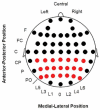Deficits in Early Sensory and Cognitive Processing Are Related to Phase and Nonphase EEG Activity in Multiple Sclerosis Patients
- PMID: 34068315
- PMCID: PMC8153279
- DOI: 10.3390/brainsci11050629
Deficits in Early Sensory and Cognitive Processing Are Related to Phase and Nonphase EEG Activity in Multiple Sclerosis Patients
Abstract
Currently, there is scarce knowledge about the relation between spectral bands modulations and the basis of cognitive impairment in multiple sclerosis (MS). In this sense, analyzing the evoked or phase activity can confirm results from traditional event-related potential (ERP) studies. However, studying the induced or nonphase activity may be necessary to elucidate hidden compensatory or affected cognitive mechanisms. In this study, 30 remitting-relapsing multiple sclerosis patients and 30 healthy controls (HCs) matched in sociodemographic variables performed a visual oddball task. The main goal was to analyze phase and nonphase alpha and gamma bands by applying temporal spectral evolution (TSE) and its potential relation with cognitive impairment in these patients. The behavioural results showed slower reaction time and poorer accuracy in MS patients compared to controls. In contrast, the time-frequency analysis of electroencephalography (EEG) revealed a delay in latency and lower amplitude in MS patients in evoked and induced alpha compared to controls. With respect to the gamma band, there were no differences between the groups. In summary, MS patients showed deficits in early sensorial (evoked alpha activity) and cognitive processing (induced alpha activity in longer latencies), whereas the induced gamma band supported the hypothesis of its role in translation of attentional focus (induced activity) and did not show strong activity in this paradigm (visual oddball).
Keywords: EEG; alpha; evoked; gamma; induced; multiple sclerosis; oddball.
Conflict of interest statement
The authors declare no conflict of interest.
Figures




Similar articles
-
Effect of the side of presentation in the visual field on phase-locked and nonphase-locked alpha and gamma responses.Sci Rep. 2022 Aug 1;12(1):13200. doi: 10.1038/s41598-022-15936-7. Sci Rep. 2022. PMID: 35915098 Free PMC article.
-
Altered phase and nonphase EEG activity expose impaired maintenance of a spatial-object attentional focus in multiple sclerosis patients.Sci Rep. 2020 Nov 26;10(1):20721. doi: 10.1038/s41598-020-77690-y. Sci Rep. 2020. PMID: 33244155 Free PMC article.
-
Multiple evoked and induced alpha modulations in a visual attention task: Latency, amplitude and topographical profiles.PLoS One. 2019 Sep 26;14(9):e0223055. doi: 10.1371/journal.pone.0223055. eCollection 2019. PLoS One. 2019. PMID: 31557253 Free PMC article.
-
[Cognitive evoked potentials in remitting-relapsing and benign forms of multiple sclerosis].Rev Neurol. 2009 May 1-15;48(9):453-8. Rev Neurol. 2009. PMID: 19396761 Spanish.
-
A high-density ERP study reveals latency, amplitude, and topographical differences in multiple sclerosis patients versus controls.Clin Neurophysiol. 2010 Sep;121(9):1420-1426. doi: 10.1016/j.clinph.2010.03.019. Epub 2010 Apr 8. Clin Neurophysiol. 2010. PMID: 20381418
Cited by
-
Sensory Integration Disorders in Patients with Multiple Sclerosis.J Clin Med. 2022 Sep 1;11(17):5183. doi: 10.3390/jcm11175183. J Clin Med. 2022. PMID: 36079113 Free PMC article.
-
Effect of the side of presentation in the visual field on phase-locked and nonphase-locked alpha and gamma responses.Sci Rep. 2022 Aug 1;12(1):13200. doi: 10.1038/s41598-022-15936-7. Sci Rep. 2022. PMID: 35915098 Free PMC article.
-
Decoupling Alpha Desynchronization from Neural Resource Use: Evidence from Cognitive Load Modulation.NeuroSci. 2025 Apr 10;6(2):32. doi: 10.3390/neurosci6020032. NeuroSci. 2025. PMID: 40265362 Free PMC article.
-
Special Issue: Neural Bases of Cognitive Processing.Brain Sci. 2021 Sep 28;11(10):1286. doi: 10.3390/brainsci11101286. Brain Sci. 2021. PMID: 34679352 Free PMC article.
-
Temporal spectral evolution of pre-stimulus brain activity in visual and visuomotor tasks.Cogn Neurodyn. 2023 Dec;17(6):1433-1446. doi: 10.1007/s11571-022-09910-2. Epub 2022 Nov 30. Cogn Neurodyn. 2023. PMID: 37969946 Free PMC article.
References
-
- Calabresi P.A. Multiple sclerosis and demyelinating conditions of the central nervous system. In: Goldman L., Schafer A., editors. Goldman’s Cecil Medicine. 24th ed. Volume 2. Elsevier; Amsterdam, The Netherlands: 2016. pp. 2347–2355.
-
- Gonzalez-Rosa J.J., Vazquez-Marrufo M., Vaquero E., Duque P., Borges M., Gomez-Gonzalez C.M., Izquierdo G. Cluster analysis of behavioural and event-related potentials during a contingent negative variation paradigm in remitting-relapsing and benign forms of multiple sclerosis. BMC Neurol. 2011;11:64. doi: 10.1186/1471-2377-11-64. - DOI - PMC - PubMed
-
- Moral-Torres E., Fernández-Fernández O., Carrascal-Rueda P., Ruíz-Beato E., Estella-Pérez E., Manzanares-Estrada R., Gómez-García T., Jiménez M., Hidalgo-Vega A., Merino M. Social value of a set of proposals for the ideal approach of multiple sclerosis within the Spanish National Health System: A social return on investment study. BMC Health Serv. Res. 2020;20:84. doi: 10.1186/s12913-020-4946-8. - DOI - PMC - PubMed

